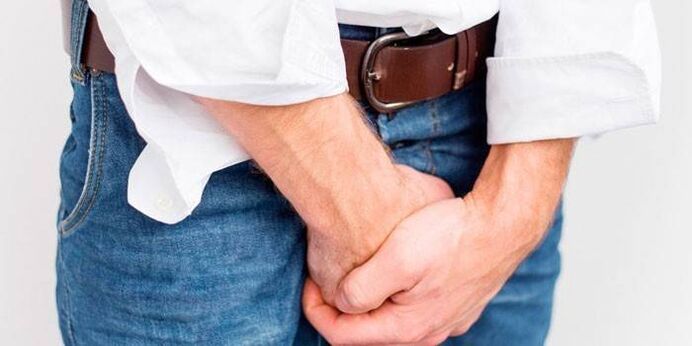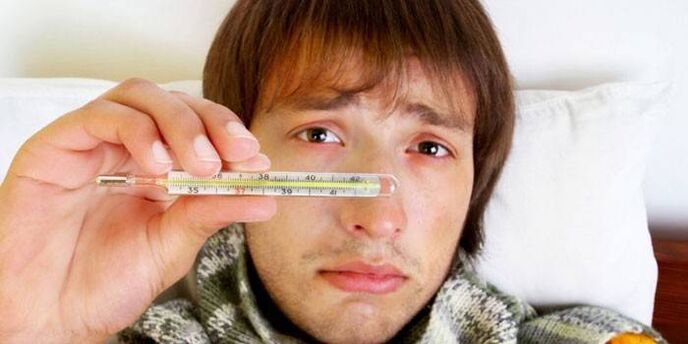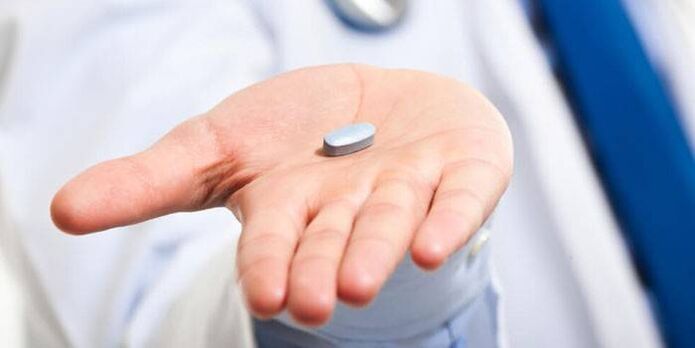Every second man of reproductive age (up to fifty years) is prone to such a sensitive disease as acute prostatitis, in which, under the influence of certain factors, the prostate (prostate gland) becomes inflamed, causing various forms of sexual dysfunction and disorderssituations. Be careful what your body says and do not neglect timely treatment.
What is acute prostatitis?
If a man feels discomfort and even pain when urinating, you should consult a doctor immediately, because acute prostatitis is an infectious disease that causes inflammation of the prostate, followed by the formation of edema of the glandular tissue, the formation of purulent foci on it. If you do not pay attention to the signs of acute inflammation of the prostate, then the pathological process can turn into a chronic form that is difficult to treat and there is very little time for reflection - the transformation occurs in a few days.
However, more serious complications are possible than its transition to a chronic form. There is a risk of sepsis - general blood infection and ascending urinary tract infection with development of pyelonephritis and cystitis. In these cases, the patient is treated urgently, the condition can be critical. Although sepsis as a complication is rare, it can occur in patients with immunosuppressive conditions - intoxication, fever, severe symptoms, weakness. Therefore, blood cultures are required to detect microorganisms.
Symptoms of acute prostatitis
Every man should know and remember the symptoms of acute prostatitis. General signs of the disease are manifested:
- Severe pain when urinating.
- Body poisoning.
- Urinary disorders (intermittent, weak, strained flow).
- Frequent desire to visit the toilet in the evening.
These are external symptoms of prostatitis, but a deeper study reveals leukocytes in the urine, traces of mucus and pus in the secretory fluid of the prostate gland. On palpation, a dense, enlarged organ is felt, the pressure will be painful. The further development of the inflammatory process is characterized by heaviness and pain in the perineum, which radiates to the penis, sacrum and rectum. As a result, it becomes difficult for the patient to empty the bladder and defecate due to severe pain. Body temperature can rise up to 38 ° C.

Causes of acute prostatitis
As this disease is inflammatory from bacteria, the following infectious agents are the causes of acute prostatitis:
- Gram-negative - Klebsiella, E. coli, Proteus.
- Gram-positive - enterococci, staphylococci, streptococci.
- Urogenital - hair loss, chlamydia, ureaplasmosis, gonorrhea, candidiasis, mycoplasmosis.
The microbial microflora penetrates the glandular tissue of the prostate, usually through the transchannel pathway (through the urethra and the secretory ducts of the prostate gland). In cystitis, the infection migrates to the prostate from the bladder. Other possible pathways for bacterial penetration are opened during intraurethral manipulations (catheter placement, urethral tingling, cystoscopy, urethroscopy). Pathogens migrate to the prostate from distant pathogens to caries, sinusitis, tonsillitis, cholecystitis, pyoderma, bronchitis.
There is a high probability of infection from the intestines with proctitis, hemorrhoidal cracks, colitis. The non-infectious factors that can cause prostatitis are congestive (congestive) venous phenomena in the pelvic area and the disturbance of the drainage of the glandular cells. Congestion can be caused by irregular or, conversely, excessive sexual activity, cessation of sexual intercourse, sedentary lifestyle, frequent constipation, frequent alcohol poisoning, varicose veins, hypothermia.
Forms of acute prostatitis
The clinical course of this disease is examined in three stages, which are simultaneously forms of acute pancreatitis. This is:
- The first stage is the catarrhal form.
- The second stage is the follicular form.
- The third stage is the parenchymal form.
Acute prostatitis in men begins with bluetongue, which is characterized by cell enlargement, the appearance of swollen glandular tissue, and, as a result, an increase in organ size. The excretory ducts of the prostate glands, which open into the posterior urethra, are actively involved in the inflammatory process. The lobes and pores of the prostate gland become inflamed, their contractility is disturbed, they narrow and block, this can make it difficult to secrete the prostate secretion.
In the catarrhal stage, the pathological process stops in the mucous layers and does not go deeper. In the process of development, the disease spreads throughout the prostate gland. Follicular acute bacterial prostatitis develops. During the analysis, pus comes out in the urine. The glandular tissues change catastrophically, the swelling continues to increase. The follicular form is still relatively easy to treat.
Further, a parenchymal form of the disease develops, the outcome of which may be a prostate abscess, i. e. chronic prostatitis. Therefore, symptoms such as:
- Increase in body temperature to 39 ° C and above.
- Manifestations of intoxication: weakness, chills, thirst, lack of appetite.
- Frequent urges to the toilet for small needs are accompanied by throbbing acute pain.
- Inability to empty the bladder.
- Inflation.
- Tenesmus.
- Constipation.
- Mucus relief from the anus.

Diagnosis of acute prostatitis
At the first suspicion of inflammation of the prostate, you rushed to the doctor. The correct and complete diagnosis of acute prostatitis is very important for fast and successful treatment. The doctor will first analyze the history, will clarify when sensations of pain appear in the perineum, if they increase or decrease during ejaculation, urination, defecation. Make sure that the doctor should study the patient's medical history: what diseases were transmitted, if there were sexually transmitted infections.
The urologist will feel the external genitalia to determine the developmental pathologies, the visible signs of prostatitis and the rectal examination - palpation of the prostate gland through the anus. To create a complete clinical picture, the following tests will need to be performed:
- Urine analysis to determine the level of leukocytes and the presence of purulent filaments.
- Blood test.
- Culture smear - the contents and scrape of the urethra are taken to determine the growth of bacteria and their sensitivity to antibiotics.
- Uroflowmetry.
- Prostate ultrasound to detect diffuse changes in the gland and abscess formation.
- A blood test to determine the presence of pathogenic diseases such as syphilis, gonorrhea, mycoplasmosis, chlamydia.
- PCR diagnostics.
Treatment of acute prostatitis
After a thorough diagnosis, they begin treatment for acute prostatitis. It is based on antibiotic therapy, the purpose of which is to suppress infectious pathogens. In addition, conservative treatment of prostatitis includes the use of:
- Anti-inflammatory drugs.
- Means that improve blood circulation.
- Painkillers and anticonvulsants.
- Drugs that support metabolic processes in the prostate.
- Multivitamins.
- Phytotherapeutic agents.
- Immunoregulators.
Advanced forms of prostate inflammation with the appearance of purulent foci require surgery. Transurethral (through the urethral wall) or transrectal (through the anal wall) drainage of the abscess areas. Surgery may be required in case of abnormal urinary retention. Epistostomy is punctured - an incision is made in the abdominal cavity, into which a tube is inserted to divert urine.

medicines
Treatment of acute prostatitis in men with drugs (tablets, injections) is the basis of successful treatment. With well-prescribed antibiotic treatment, the infection can be overcome in a few days. However, it is recommended to continue the treatment for four weeks in order to achieve complete eradication of the pathogenic microflora. The drugs used for the disease are:
- Etiotropic (antibiotics) - destroying pathogens.
- Pathogenetics (NSAIDs) - elimination of congestion in the prostate.
- Symptomatic (analgesic, antipyretic) - pain relief, muscle spasms of the organ and other symptoms.
For the treatment of prostate inflammation, the doctor may prescribe a set of drugs, which will include:
- Injections - contribute to the penetration of the drug into the tissues of the body in a short time.
- Candles (rectum) - analgesic, antibacterial effect.
- Instructions - administration of the drug to the prostate through the opening of the urethra.
- Microcirculators with herbal decoctions.
- Antibacterial drugs with a wide range of action, if no specific causative agent of the disease is identified.
Antibiotics for acute prostatitis
The main causative agents of prostatitis are pathogenic bacteria that cause inflammation in the tissues of the prostate gland. Therefore, antibiotics for acute prostatitis are the basis of treatment and are prescribed only after a sensitivity test on the microflora. Antimicrobials used for inflammation are divided into the following groups:
- Fluoroquinolones.
- penicillins.
- Cephalosporins.
- Macrolides.
- Tetracyclines.
- Aminoglycosides.
Prevention of acute prostatitis
In order for a man to always be healthy, full of strength, it is important to prevent acute prostatitis, including:
- Regular sex life with a regular partner, excluding casual relationships.
- Use of condoms.
- Quit smoking, drugs, alcohol.
- Proper nutrition.
- personal hygiene.
- Annual preventive examinations at the urologist.
- Taking vitamins and zinc preparations.
It is important to completely cure diseases of the urogenital organs (urethritis, cystitis, pyelonephritis, balanoposthitis). Untreated diseases can cause an inflammatory process to develop in the prostate gland. Among other things, we must not forget the increase in physical activity. In cold weather, hypothermia should be avoided. Prostate massage is very useful for men's health. However, if the disease has already been felt, massage is contraindicated and even impossible due to the pain of the organ.





























